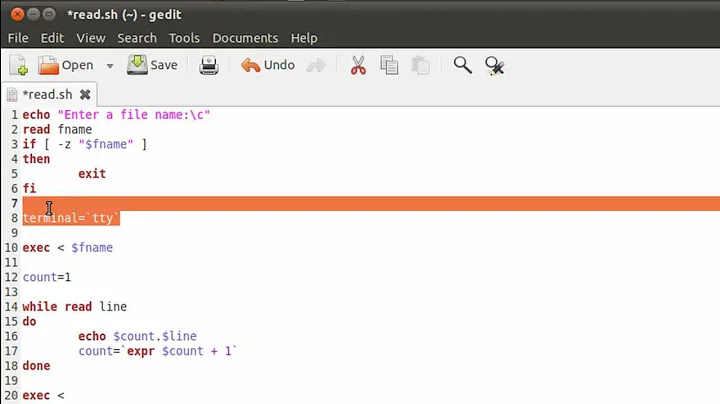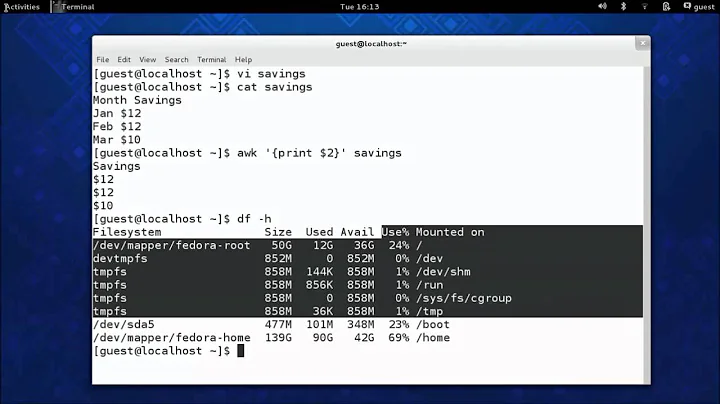Extract version number from file in shell script
Solution 1
$ v=1.2.13
$ echo "${v%.*}.$((${v##*.}+1))"
1.2.14
$ v=11.1.2.3.0
$ echo "${v%.*}.$((${v##*.}+1))"
11.1.2.3.1
Here is how it works:
The string is split in two parts.
- the first one contains everything but the last dot and next characters:
${v%.*} - the second one contains everything but all characters up to the last dot:
${v##*.}
The first part is printed as is, followed by a plain dot and the last part incremented using shell arithmetic expansion: $((x+1))
Solution 2
Pure Bash using an array:
version='1.2.33'
a=( ${version//./ } ) # replace points, split into array
((a[2]++)) # increment revision (or other part)
version="${a[0]}.${a[1]}.${a[2]}" # compose new version
Solution 3
I prefer "cut" command for this kind of things
major=`echo $version | cut -d. -f1`
minor=`echo $version | cut -d. -f2`
revision=`echo $version | cut -d. -f3`
revision=`expr $revision + 1`
echo "$major.$minor.$revision"
I know this is not the shortest way, but for me it's simplest to understand and to read...
Solution 4
Yet another shell way (showing there's always more than one way to bugger around with this stuff...):
$ echo 1.2.3 | ( IFS=".$IFS" ; read a b c && echo $a.$b.$((c + 1)) )
1.2.4
So, we can do:
$ x=1.2.3
$ y=`echo $x | ( IFS=".$IFS" ; read a b c && echo $a.$b.$((c + 1)) )`
$ echo $y
1.2.4
Solution 5
Awk makes it quite simple:
echo "1.2.14" | awk -F \. {'print $1,$2, $3'} will print out 1 2 14.
flag -F specifies separator.
If you wish to save one of the values:
firstVariable=$(echo "1.2.14" | awk -F \. {'print $1'})
Related videos on Youtube
Dougnukem
Worked at some game companies and social game startups, working on a new web startup currently. Personal Website
Updated on January 11, 2020Comments
-
Dougnukem over 4 years
I'm trying to write a bash script that increments the version number which is given in
{major}.{minor}.{revision}For example.
1.2.13Is there a good way to easily extract those 3 numbers using something like sed or awk such that I could increment the {revision} number and output the full version number string.
-
Dougnukem almost 13 yearsI'm not sure this has anything to do with the problem I asked, maybe I'm misunderstanding what $IFS is and what $version is being set to.
-
geekosaur almost 13 years
$IFSis what the shell uses to do its own field ("word") splitting; I am saving the original value (space, tab, newline) and setting it to., then usingsetto force$versionto be word split. I'll expand on the answer. -
David W. almost 13 yearsmod +1: Very ingenious. IFS is the "Input Field Separator" used by the shell. It is normally set to tab, space, return. geekasaur is changing it to the period. The
set -- $versionis replacing the command line parameters with the $version field which is split by periods. Thus, the three portions are now$1,$2,$3. If you don't want to use set, you can instead try this:echo $version | read major minor revision. It's not as compact, but doesn't mess with your command line parameters which you still might be using. -
David W. almost 13 yearsBut you'd have to repeat the
echo | awkthree times for each one. -
geekosaur almost 13 years@David: note that the
whileloop may run in a subshell, with possibly surprising results (for example, variable settings in the loop won't be seen byt he rest of the script). stackoverflow.com/questions/6245246/… -
bbaja42 almost 13 years+1, very readable way to skin a cat. Can you explain why it was necessary to write IFS=".$IFS" instead of simply IFS="." ? I've checked IFS="." and it does not work correctly.
-
bbaja42 almost 13 yearsTrue. I prefer Cris J answer.
-
Chris J almost 13 yearsParanoia on my part, as something will fail to work if the default's not there as well :-) My guess is that if IFS doesn't include the newline (by default it's got a space, a tab and a newline), then read doesn't work properly. That said, I've just tried it here, and doing IFS="." works fine here... (bash 3.2.51 running under cygwin).
-
David W. almost 13 yearsMan you're fast. I saw the
whileline in my comments and removed it. It didn't take me more than a minute. Old habit of piping input into a while read loop. Actually, what I put doesn't work in BASH, but does work in Kornshell which is what I use. It's fully compatible with BASH, except when it isn't. In order for this to work in bash, you have to put$versionas a here document. -
Fritz G. Mehner almost 13 years4 subshells, 3 pipes, 3 complete processes (at least) just to change one or two characters! That is a little too much.
-
smithfarm over 11 yearsWhat geekosaur wrote is exactly what the doctor ordered! I tested David W.'s idea of using
echo $version | read major minor revisioninstead ofset -- $versionbut that didn't work at all. -
Florian over 11 yearsI like this version as it makes no assumption about how many parts the version has. To compose the new version one would have to set
IFSand use"${a[*]}", though. Thanks, was able to put it to good use! -
Huygens over 6 years@fgm but at least it works whether you're using bash or not. +1 And you can of course simplify this: echo "$(echo $version | cut -d. -f-2).$(expr $(echo $version | cut -d. -f3) + 1)" it is still a lot of subshells and pipes, but unless you're using a super micro under-powered embedded device that should not matter. If you are after speed, then bash is perhaps not the best choice in the first place ;-)
-
 Antônio Medeiros over 2 yearsThank you! In case anyone just needs
Antônio Medeiros over 2 yearsThank you! In case anyone just needsmajor.minor, this should give it:echo "1.2.14" | awk -F \. '{version=$1"."$2; print version}'will print out1.2.








